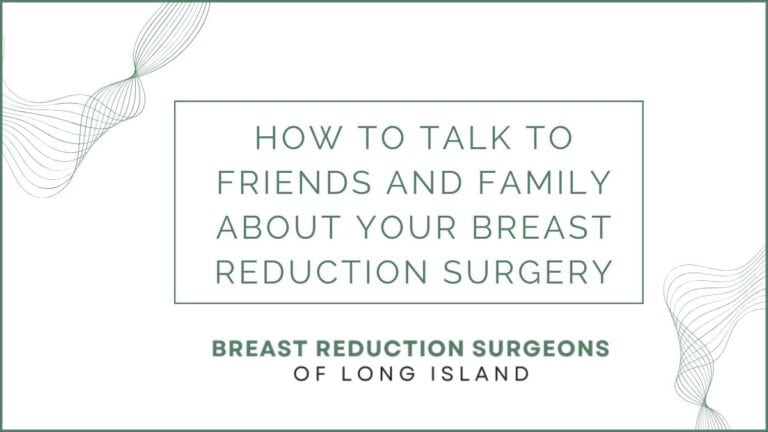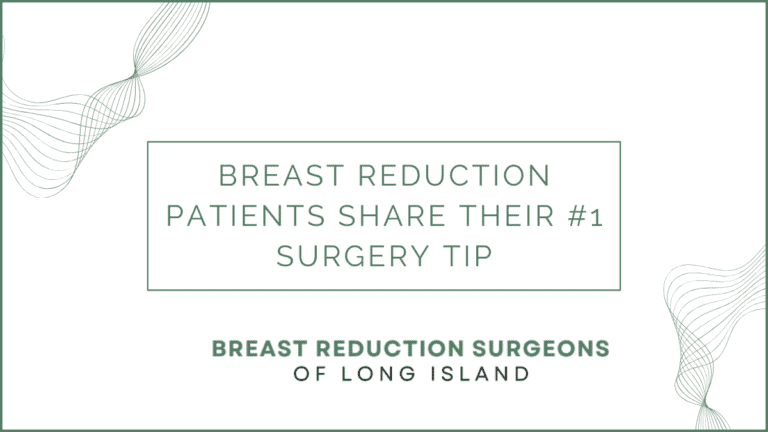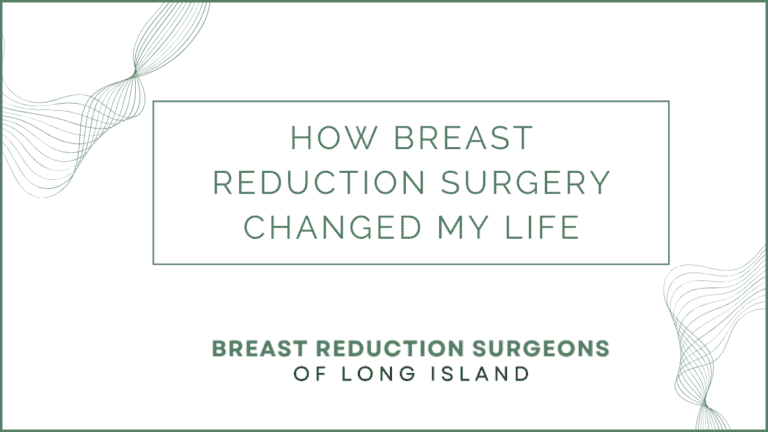At Breast Reduction Surgeons of Long Island, we know that deciding to have breast reduction surgery is deeply personal. While the physical and emotional benefits are well-documented, what often goes unspoken is the challenge of talking about your decision with others.
Patients often ask us: Should I tell people? What if they don’t understand? How do I respond to awkward questions?
One of our patients generously offered to share her experience navigating these conversations with her friends, family, and coworkers. Her story is full of practical insights and strategies for those preparing to talk about their breast reduction surgery.
She will now give us more insights into how she approached sharing her decision and what she learned along the way.

Why I Chose to Talk About It (and Why You Don’t Have To)
When I first scheduled my breast reduction, I wasn’t sure how open I wanted to be. Part of me felt like I owed people an explanation, but another part just wanted privacy.
I eventually told a few close friends and family members but only once I felt ready. That was key. I didn’t share because I felt obligated. I did it because I wanted to.
It’s important to know that there’s no right or wrong way to handle this. Some people choose full transparency. Others say nothing at all. It’s your body and your choice.
How I Started the Conversation
Starting the conversation was the hardest part. I didn’t want to make it awkward or overly serious, but I also didn’t want to downplay it.
Here are a few ways I approached it with different people:
- With my mom: “I’ve been dealing with back pain for years. I’ve decided to have a breast reduction. It’s the right choice for my health.”
- With close friends: “Hey, just a heads-up that I’ll be out for a bit recovering from surgery. I’m finally getting a breast reduction!”
- With coworkers: “I’ll be taking some time off soon for a procedure. Just wanted to give you a heads-up in case anything comes up.”
I tailored each explanation depending on the relationship. Some people got the full story. Others got just enough to understand.
Common Reactions and How I Handled Them
Most people were supportive. A few surprised me with comments I didn’t expect. Here’s what I ran into:
Positive Support
A lot of people responded with empathy and encouragement. Friends asked thoughtful questions. A cousin even told me she’d been considering the same surgery but hadn’t felt brave enough to admit it until I brought it up.
Confusion or Misunderstanding
A few people didn’t quite get it. I heard things like:
- “Why would you want smaller boobs?”
- “Aren’t big breasts a blessing?”
- “Won’t you regret it?”
At first, these comments bothered me. But then I realized that they just didn’t understand. Here’s how I responded:
- “It’s not about size. It’s about pain, posture, and being able to move comfortably.”
- “This isn’t cosmetic for me, it’s about quality of life.”
Inappropriate Curiosity
One or two people got too personal. Questions about scarring, appearance, or size changes. I learned to set boundaries quickly.
If someone asked something I wasn’t comfortable answering, I’d say:
- “I’m keeping those details private, but I’m feeling really positive about my decision.”
- “I’d rather not get into specifics, but thanks for your concern.”
Tips for Talking About Your Surgery
If you’re preparing to talk to friends or family about your breast reduction, here are some tips that helped me feel more in control of the conversation:
- Decide what you want to share: Think ahead about your comfort level. You don’t owe anyone full details.
- Practice a short explanation: Keep it simple and matter-of-fact so you’re not caught off guard.
- Anticipate different reactions: Most will be supportive. Some may be confused. Prepare your response with compassion but stand firm.
- Remember why you’re doing it: Don’t let someone’s opinion shake your confidence in your choice.
- Give yourself time: If you’re not ready to talk about it, you don’t have to. You can always share more later.
Setting boundaries and having a few responses ready made these conversations much easier for me.
When I Chose Not to Say Anything
There were a few people I didn’t tell such as acquaintances, distant relatives, and casual coworkers. When I returned to work, some noticed I looked a little different. I just smiled and said, “I’ve been focusing on my health.” That was enough.
You are never required to disclose your surgery. It’s okay to keep that part of your life private, especially if you’re still healing emotionally or physically.
Looking Back, I’m Glad I Opened Up
Now that I’m several months out from surgery, I’m proud of myself for being honest. Talking about it not only gave me support, it helped normalize something that many women experience but few discuss.
My conversations led to unexpected connections. Two of my friends have since gone in for consultations. One even told me, “You made it feel okay to talk about.”
Empower Your Decision with Confidence
This story is a reminder that conversations about breast reduction don’t have to feel awkward or uncertain. At Breast Reduction Surgeons of Long Island, we guide our patients not only through the procedure itself, but also through the emotional and social aspects that surround it.
Whether you choose to share your journey or keep it private, know that it’s your decision. We’re here to support you at every stage. If you’re considering breast reduction surgery, schedule a consultation with us today and take the next step toward comfort and confidence.





